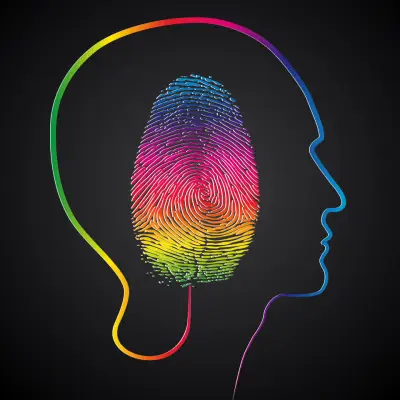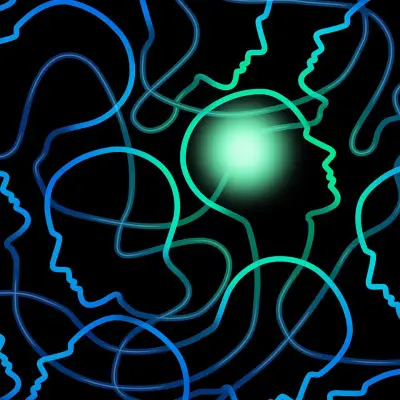Dreams about falling are among the most common and frequently reported types of dreams. If you've ever found yourself plummeting through the air, only to wake up with a start, you're not alone. These dreams can be unsettling, but they can also provide valuable insights into your subconscious mind. Let's explore what it means when you dream you're falling.
Jump To:
- Why Do You Dream About Falling?
- Common Falling Dreams and Their Meanings
- What Does It Mean When Someone Dreams About You Falling?
- How Do I Stop Dreaming About Falling?
- Cultural Interpretations of Falling in Dreams
- Spiritual Meaning of Falling in Dreams
- Frequently Asked Questions About Falling in Dreams
- Study Dream Analysis for £29
Why Do You Dream About Falling?

Falling dreams often occur during times of stress or significant change in your life. They can be triggered by feelings of insecurity, instability, or fear of failure. Here's a look at some of the reasons why you might dream about falling:
Psychological Factors
- Loss of Control: Falling dreams can symbolise a feeling of losing control over aspects of your life. This might relate to work, relationships, or other personal responsibilities where you feel overwhelmed or unable to manage the situation effectively. The sensation of falling in your dream mirrors the lack of control you feel in your waking life, highlighting areas where you might need to reassess and regain your balance.
- Fear of Failure: Concerns about failing in personal or professional areas can manifest as falling dreams. If you're anxious about not meeting expectations, whether your own or others', this fear can translate into the sensation of falling. The dream acts as a metaphor for the descent into failure, urging you to confront and address these fears. Understanding this connection can help you focus on building confidence and setting realistic goals.
- Insecurity: Feelings of vulnerability or lack of support might trigger these dreams. When you feel exposed or unprotected, your subconscious might express this through a falling dream. It highlights areas in your life where you feel unstable or unsupported, whether emotionally, financially, or socially. Recognising this can be the first step towards seeking support and strengthening your foundations.
Biological Factors
- Hypnic Jerks: As your body transitions from wakefulness to sleep, your muscles relax. Sometimes, your brain misinterprets this relaxation as falling, causing a sudden jolt that wakes you up. This phenomenon, known as a hypnic jerk, is more likely to occur when you're overtired or experiencing irregular sleep patterns. It's a natural part of the sleep process and usually harmless, though it can be startling.
- Sleep Stages: The different stages of sleep can also influence falling dreams. As you move through various sleep cycles, particularly between light and deep sleep, your body and brain undergo significant changes. These transitions can sometimes be misinterpreted by your brain, leading to the sensation of falling. This is especially common if your sleep is disrupted or if you suffer from sleep disorders.
- External Stimuli: External factors, such as sounds or movements, can also trigger falling dreams. If there's a sudden noise or physical disturbance while you're sleeping, your brain might incorporate this into your dream, creating a scenario where you're falling. This integration of real-world stimuli into the dream narrative can make the experience feel more vivid and real.
Recommended for you!
Best SellersCommon Falling Dreams and Their Meanings
Analysing your dreams can be a helpful way to understand your subconscious. Here are some common scenarios for falling dreams and their interpretations:
Falling from a Great Height
This is the most typical falling dream and often signifies a fear of losing control or a sense of failure in some aspect of your life. You might be facing pressures or challenges that make you feel as though you are about to "fall" or fail. This type of dream highlights your anxieties about not meeting expectations, either your own or those of others. Understanding this can help you address these fears and regain a sense of control and confidence.
Falling and Getting Up
Dreaming of falling and then getting up suggests resilience and the ability to recover from setbacks. This type of dream indicates that, despite facing difficulties or challenges, you have the strength to rise again and continue moving forward. It’s a positive sign that you possess the determination and resilience needed to overcome obstacles and emerge stronger from adversities.
Falling in Darkness
Falling in complete darkness can represent a fear of the unknown or a feeling of being lost or unsupported. This scenario might arise during times of uncertainty or significant change in your life, where you feel you lack direction or guidance. The dream reflects your inner turmoil and the need to find stability and clarity. It’s a call to seek support, trust in your journey, and navigate through the unknown with courage and faith.
Falling and Landing Safely
If you dream of falling but then landing safely, it can symbolise your ability to face your fears and come out unscathed. This type of dream suggests that even though you may encounter challenges, you have the capability to handle them and find a safe resolution. It reflects confidence and the ability to manage stressful situations effectively.
Falling Off a Cliff
Dreaming of falling off a cliff often indicates a fear of taking significant risks or making important decisions. This type of dream can point to feelings of apprehension about stepping into the unknown or embarking on a new path. It highlights your concerns about the potential consequences of your choices and the need for careful consideration and preparation.
Falling in Water
Falling into water in a dream can represent emotions and unconscious fears. Water is often associated with emotions, so falling into water might suggest that you are overwhelmed by your feelings or struggling to stay afloat emotionally. This type of dream encourages you to explore and address your emotional state and find ways to manage your feelings constructively.
Falling in Slow Motion
Experiencing a slow-motion fall in a dream can symbolise a gradual loss of control or a slow descent into a difficult situation. This type of dream might reflect a situation in your waking life where you feel things are deteriorating slowly but surely. It serves as a warning to take action and address the issues before they escalate further.
Falling Through the Sky
Dreaming of falling through the sky can be a metaphor for feeling untethered or disconnected from reality. It might indicate a sense of freedom but also a lack of grounding. This type of dream can highlight the need to find a balance between freedom and stability, encouraging you to establish a more secure foundation in your life.
Falling and Unable to Stop
A dream where you are falling and unable to stop can symbolise a sense of helplessness or a lack of control in your life. This scenario often reflects feelings of being caught in a situation where you cannot see a way out. It’s a call to seek help, regain control, and find solutions to break free from the cycle of helplessness.
What Does It Mean When Someone Dreams About You Falling?
If someone else dreams about you falling, it might reflect their concerns about your well-being. They might perceive you as struggling or facing difficulties in your life. This type of dream can also indicate their feelings of helplessness or inability to support you adequately.
How Do I Stop Dreaming About Falling?

While falling dreams can be unsettling, there are steps you can take to reduce their occurrence and improve your overall sleep quality. Here are some strategies you can employ:
Manage Stress
Stress is a common trigger for falling dreams. To reduce stress and its impact on your sleep, consider incorporating the following activities into your daily routine:
Meditate
Meditation can help calm your mind and reduce anxiety. Practising mindfulness meditation for even just 10-15 minutes a day can promote relaxation and decrease stress levels. Focus on your breathing and let go of any intrusive thoughts. This practice can help you achieve a more peaceful state of mind before bedtime.
Exercise
Regular physical activity is an excellent way to reduce stress. Aim for at least 30 minutes of moderate exercise most days of the week. Activities like walking, jogging, yoga, or dancing can help release endorphins, the body’s natural stress relievers. Avoid vigorous exercise too close to bedtime, as it might interfere with your sleep.
Practise Deep Breathing
Deep breathing exercises can quickly reduce stress and anxiety. Techniques such as diaphragmatic breathing, where you breathe deeply into your abdomen, can help relax your nervous system. Try practising deep breathing for a few minutes before bed to help your body transition into a restful state.
Maintain a Healthy Sleep Routine
A consistent and calming sleep routine is key for reducing falling dreams. Going to bed and waking up at the same time every day helps regulate your body’s internal clock. Create a relaxing pre-sleep routine to signal to your body that it’s time to wind down. This could include activities such as reading a book, taking a warm bath, or listening to soothing music. Avoid stimulating activities like watching TV or using electronic devices right before bed, as the blue light emitted by screens can interfere with your ability to fall asleep. Finally, ensure that your bedroom is conducive to good sleep. Keep the room cool, dark, and quiet, and invest in a comfortable mattress and pillows. If noise is an issue, consider using earplugs or a white noise machine to block out disturbances.
Identify Sources of Insecurity
Identify areas in your life where you feel insecure or out of control. This might include work, relationships, or personal goals. Understanding the root cause of your insecurities is the first step towards addressing them.
Seek Support
Don’t hesitate to seek support from friends, family, or a mental health professional. Talking about your concerns and fears can provide relief and new perspectives. Professional counselling or therapy can offer more structured support for dealing with deeper issues.
Cultural Interpretations of Falling in Dreams
Different cultures have varied interpretations of falling dreams. These interpretations often reflect the unique beliefs, values, and philosophies of each culture. Here are some examples from around the world:
Western Cultures
In many Western cultures, falling dreams are often seen as a sign of insecurity or a fear of failure. They are thought to reflect inner anxieties and stress. This interpretation aligns with the Western emphasis on individual achievement and control. In these cultures, falling dreams might be a subconscious manifestation of the pressures to succeed and the fear of not meeting societal or personal expectations.
Eastern Cultures
In some Eastern cultures, falling dreams can be interpreted as a need to let go of control and trust in the flow of life. They might be seen as a reminder to surrender to the natural order of things. Eastern philosophies often emphasise balance, harmony, and the acceptance of life’s ebb and flow. Therefore, a falling dream could be a sign to embrace change and let go of resistance.
Native American Cultures
Among various Native American tribes, dreams are considered powerful messages from the spirit world. Falling dreams might be interpreted as a spiritual warning or a sign of a need for greater grounding and connection with the Earth. They may suggest that the dreamer needs to reconnect with their community and traditions to restore balance.
Australian Aboriginal Cultures
In Australian Aboriginal cultures, dreams are crucial to spiritual life and understanding your place in the world. Falling dreams might be viewed as a journey into the Dreamtime, a parallel reality that reflects the spiritual essence of the world. Such dreams could indicate a need to explore your spiritual path or to seek guidance from ancestral spirits.
African Cultures
In many African cultures, falling dreams might be seen as a sign of impending danger or a warning from the ancestors. They can also represent a call to examine your life choices and ensure they align with the community's values and expectations.
Middle Eastern Cultures
In Middle Eastern cultures, dreams are often seen as prophetic or carrying significant messages. Falling dreams might be interpreted as a warning of potential pitfalls or challenges ahead. They could also signify a need for spiritual or moral introspection, urging the dreamer to re-evaluate their path and make necessary adjustments.
Latin American Cultures
In Latin American cultures, which often blend indigenous, African, and Spanish influences, dreams are seen as a mix of personal and spiritual insights. Falling dreams might be interpreted as a sign of losing your way or experiencing a lack of support. They could also be seen as a prompt to seek help from family or community to regain stability.
Chinese Culture
In Chinese culture, which is heavily influenced by Taoism, Buddhism, and Confucianism, falling dreams might be interpreted as a sign of imbalance in life. They could suggest a need to restore harmony and balance, perhaps through meditation, reflection, or adjusting your actions to be more in line with the principles of yin and yang.
Indian Culture
In Indian culture, particularly within Hinduism and Buddhism, falling dreams might be interpreted as a sign of spiritual descent or a need to rise above worldly attachments. They could indicate a need for greater spiritual discipline and practice.
Greek and Roman Cultures
In ancient Greek and Roman cultures, dreams were often considered messages from the gods or the deceased. Falling dreams might have been seen as a divine warning or a sign of displeasure from the gods. They could also represent a loss of favour or a need to appease the divine through offerings or changes in behaviour.
Spiritual Meaning of Falling in Dreams

From a spiritual perspective, falling in dreams can carry several meanings:
- Letting Go: Falling might indicate the need to release something that no longer serves you.
- Trusting the Universe: Falling can be a sign that you trust the process of life and have faith in a higher power.
- Inner Transformation: Falling dreams might symbolise a transition or transformation happening within you, urging you to embrace change.
Recommended for you!
Best SellersFrequently Asked Questions About Falling in Dreams
How Common is the Falling Dream?
Falling dreams are among the most common types of dreams, experienced by nearly everyone at some point. They are universal and can occur at any age, often reflecting common human fears and anxieties. Their prevalence makes them a widely studied topic in psychology and dream analysis.
Why Do I Dream of Falling Then Jerk Awake?
This occurs when your brain misinterprets the muscle relaxation during sleep onset as actual falling, triggering a jolt that wakes you up. The hypnic jerk is your body's way of responding to the perceived fall, a reflex likely rooted in ancient survival mechanisms.
Why Do Some People Dream of Falling Frequently?
Frequent falling dreams can indicate ongoing stress or unresolved issues in your life. If you're experiencing these dreams regularly, it might be a sign that there are persistent fears or anxieties that need to be addressed. Reflecting on what might be causing these feelings in your waking life can help reduce the frequency of these dreams.
Can Falling Dreams Predict the Future?
While falling dreams can reflect current emotions and fears, there is no scientific evidence to suggest that they predict future events. They are more likely a way for your subconscious mind to process feelings of insecurity, instability, or fear.
Do Falling Dreams Mean the Same Thing for Everyone?
The meaning of falling dreams can vary based on individual experiences, cultural background, and personal circumstances. While common themes like fear of failure or loss of control are prevalent, the specific interpretation can differ from person to person.
Are Falling Dreams Related to Physical Health?
In some cases, falling dreams can be related to physical health, particularly if they are frequent and accompanied by other symptoms. Conditions like sleep apnea or restless leg syndrome can cause disruptions in sleep that might trigger falling dreams. If you have concerns, it's best to consult a healthcare professional.
Study Dream Analysis for £29
If you're intrigued by the meanings behind your dreams and want to delve deeper, consider exploring dream analysis. At Centre of Excellence, we offer a Dream Analysis Therapy Diploma Course designed to help you understand and interpret your dreams. For a limited time, you can enrol for just £29.













